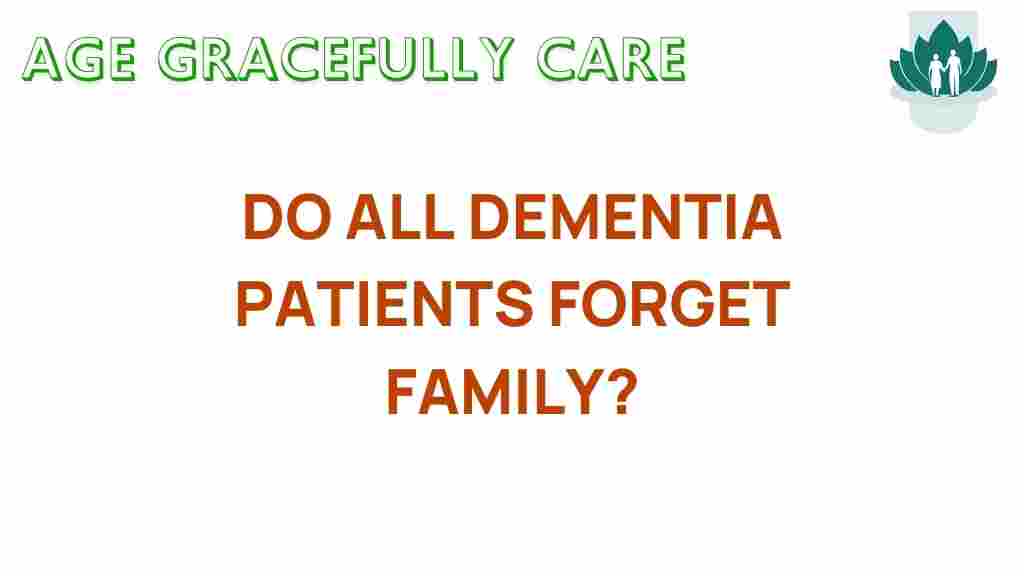Do All Dementia Patients Forget Their Loved Ones? Unraveling the Myths
Dementia is a term that encompasses a range of neurological disorders characterized by memory loss, cognitive decline, and changes in behavior. One of the most common misconceptions about dementia is that all patients forget their loved ones. This myth has caused significant emotional distress for families and caregivers, leading to feelings of isolation and frustration. In this article, we will explore the intricacies of dementia, memory loss, emotional bonds, and family connections, aiming to clarify common misconceptions and provide support for those affected.
The Reality of Memory Loss in Dementia
Understanding dementia requires a look into how it affects memory and emotional connections. While memory loss is a hallmark of dementia, the degree to which it impacts relationships varies among individuals. Here are key points to consider:
- Gradual Memory Loss: Dementia typically progresses over time, affecting short-term memory first. Long-term memories, especially those related to emotional bonds, may remain intact longer.
- Emotional Recognition: Many patients retain the ability to recognize loved ones, even if specific details about their lives may fade.
- Individual Differences: Each person’s experience with dementia is unique. Factors such as type of dementia, age, and overall neurological health play significant roles.
Types of Dementia and Memory Loss
There are several types of dementia, each affecting memory and cognitive functions differently:
- Alzheimer’s Disease: The most common form, it often leads to significant memory loss and confusion.
- Vascular Dementia: Caused by reduced blood flow to the brain, this type may lead to sudden memory loss but can preserve emotional connections longer.
- Lewy Body Dementia: This type can cause fluctuations in memory and cognition, along with visual hallucinations.
Family Connections and Emotional Bonds
Despite the challenges posed by dementia, emotional bonds with family members can remain strong. Understanding how these connections evolve can help caregivers and families provide better support.
Maintaining Connections Through Caregiving
Caregiving plays a crucial role in preserving family connections. Here are some strategies to enhance emotional bonds:
- Engagement: Engage in activities that the patient enjoys, such as listening to music, looking through photo albums, or participating in simple games.
- Communication: Use simple language and maintain eye contact. Speak slowly and clearly, allowing time for responses.
- Routine: Establishing a daily routine can provide a sense of security and familiarity, reducing anxiety and confusion.
Understanding Misconceptions About Memory Loss
There are several common misconceptions about dementia and memory loss that can lead to misunderstandings:
- Myth 1: All dementia patients forget their loved ones completely.
- Myth 2: Memory loss is solely a result of aging.
- Myth 3: Patients with dementia cannot form new memories or emotional connections.
Addressing these misconceptions can help families and caregivers create a more supportive environment for their loved ones.
Supporting Loved Ones with Dementia
Supporting a loved one with dementia involves understanding their needs and challenges. Here are some ways to provide effective support:
Step-by-Step Process for Caregiving
- Assess Needs: Determine the level of care required based on the individual’s condition and preferences.
- Seek Professional Help: Consult healthcare professionals for advice on managing symptoms and behaviors associated with dementia.
- Create a Support Network: Involve family members, friends, and support groups to share caregiving responsibilities and emotional support.
- Educate Yourself: Learn more about dementia, its effects, and how to communicate effectively with your loved one.
- Practice Patience: Recognize that progress may be slow and that emotional ups and downs are part of the caregiving journey.
Troubleshooting Tips for Caregivers
Caregivers may face various challenges while providing support to someone with dementia. Here are some troubleshooting tips:
- Dealing with Confusion: If your loved one becomes confused, redirect their attention to a familiar activity or topic.
- Managing Agitation: Use calming techniques such as soothing music or gentle touch to help reduce agitation.
- Handling Repetition: If your loved one repeats questions or statements, respond calmly and patiently, as they may not remember the previous conversation.
Conclusion
In conclusion, while dementia can lead to significant memory loss and cognitive decline, it is important to understand that not all dementia patients forget their loved ones entirely. Emotional bonds and family connections can often persist despite the challenges posed by this condition. By addressing misconceptions and providing compassionate caregiving, families can maintain meaningful relationships with their loved ones. For more information about dementia and support resources, visit National Institute on Aging or connect with local support groups.
Ultimately, fostering a supportive environment can help individuals with dementia feel valued and connected, ensuring that the emotional ties that bind families remain strong throughout the caregiving journey.
This article is in the category Health and created by AgeGracefullyCare Team
